After life
For those mourning the loss of a loved one, death is only the beginning. There are legal formalities to deal with, burial space to be found and, more often than you may imagine, scams to be avoided.
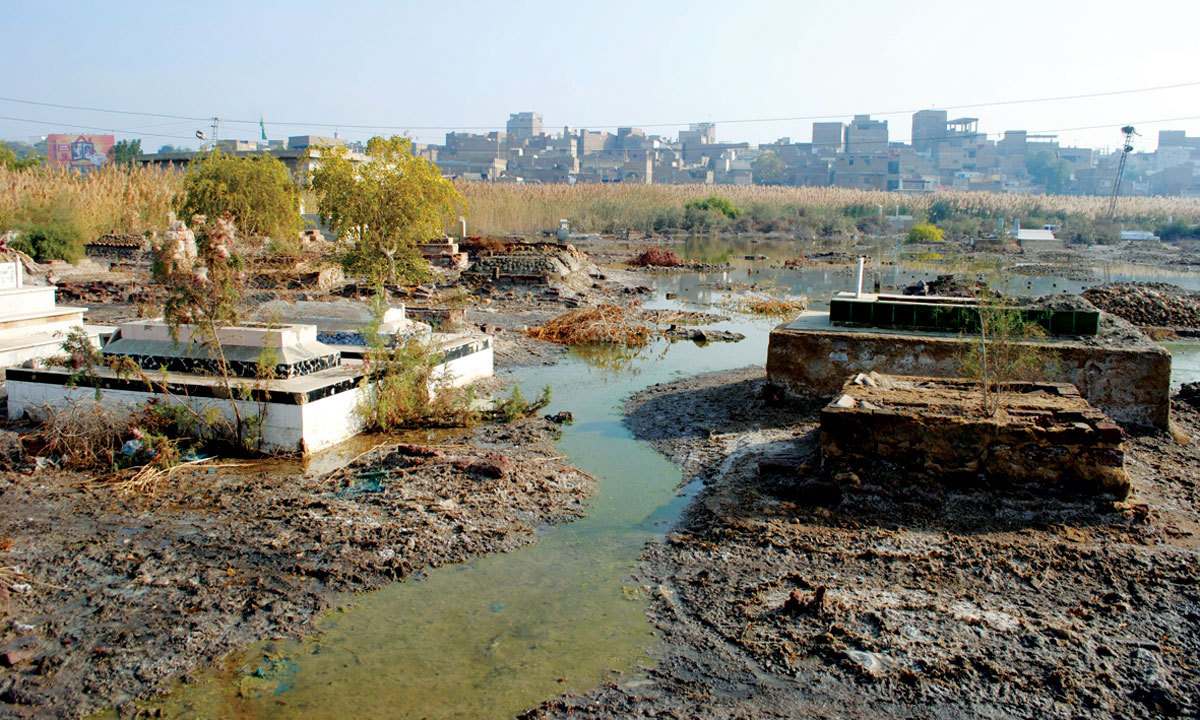
No land, no light, stray dogs and sewage water. Welcome to Hyderabad's graveyards.
“Sometimes relatives insist on burying their dead among the graves of their other family members. So if, while digging, we come across old bones, we put them in a separate grave,” says Mohammad Rafiq, a gravedigger in Tando Yousuf graveyard, Hyderabad. According to Rafiq, the graveyard is around 200 years old and a new grave can only be made by digging up an old one. It is quite possible to find another person’s gravestone when you go looking for the grave of a dear one after some time.
While the situation is more or less the same throughout the country, we take Hyderabad as a case. It has more or less 25 big and small Muslim graveyards besides a few for the Christian and Hindu communities. Graveyards located within the limits of Hyderabad Municipal Corporation (HMC) are hit by insufficient space, sewerage, and drainage and lighting issues. The Tando Yousuf graveyard, located within the limits of HMC, has the largest number of graves. It’s still being used for burial as authorities have not been able to allot land for new graveyards in other areas.
Finding space is not the only problem that the bereaved have to face. When a body is brought for burial, the family has to arrange wooden tracks, soil and bricks for preparing the grave. It also has to get an entry done in the record book of the HMC available with the chowkidar.
“We are not employees of the HMC, so we charge the families for our labour,” says Rafiq.
“Edhi’s volunteers pay us Rs1,000 for the burial of unclaimed bodies and we don’t object to it though we charge a little higher for labour charges from others,” adds Abid, a junior gravedigger.
They’re not the only ones digging the ground; stray dogs can be seen roaming around the graveyard, pawing at the soil. It’s impossible for the few chowkidars to keep them away, especially at night when the graveyard is shrouded in darkness.
Seven years ago, high light towers similar to streetlights were constructed in some major graveyards of the city. However, their upkeep is difficult.
“Drug addicts cut their wires and then we have to arrange for repairs to somehow keep the system going,” remarks Abid.
The drainage system is simply non-existent and sewage water accumulates in the graveyards as these are mostly surrounded by densely populated areas or industrial units.
Adjacent to the Tando Yousuf graveyard is a graveyard reserved for the scheduled castes. Dalits or scheduled caste community bury their dead after symbolically burning a thumb of the deceased. Upper caste Hindus, however, cremate the corpse, barring those of infants, which are buried.
“Sewage is deliberately released there so that Dalits find some other place for burial,” claims M. Parkash, a local community leader. He adds that the community has been running from pillar to post to fix this problem but in vain. “It is not impossible, but just needs a few million rupees to put a drainage system in place and ensure the upkeep of the graveyard,” he says.
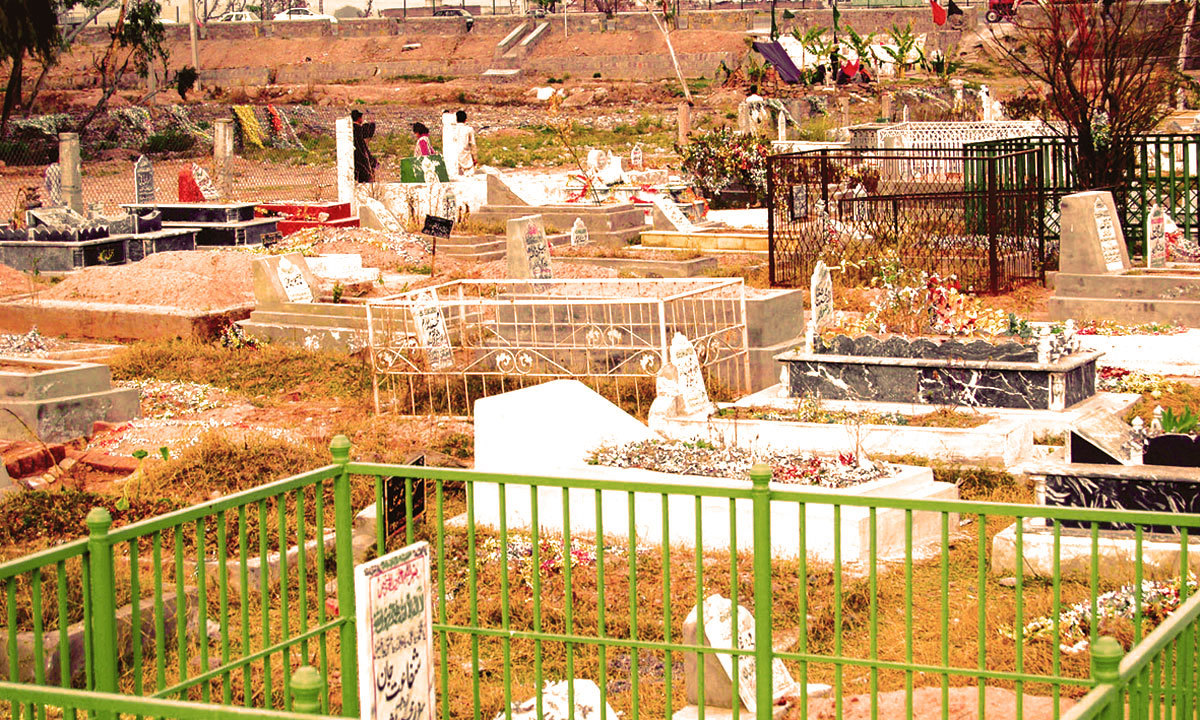
Besides the HMC graveyards are the three Cantonment Board Hyderabad (CBH) graveyards. But the CBH runs only the Cantonment one for which it issues permission. Non-CBH residents can be buried there but the process is painstaking. If you have contacts within the garrison or at a senior level of the army, then the sitting Station Commander issues permission.
The CBH charges Rs20,000 for non-cantonment residents, Rs3,000 from its taxpayer residents and Rs10,000 from residents of katchi abadis. “People living in Katchi Abadis do not pay taxes, but they bury their dead in our graveyard so we charge them Rs10,000,” says a board official.
A former CBH councillor Mohammad Farooq points out that it is unfair that, despite being CBH residents, they pay Rs10,000 besides incurring burial expenses of an equal amount. “It is really difficult for a resident of a katchi abadi to arrange such an amount in a hurry. Why doesn’t the CBH recover a fixed amount, say Rs1,000, from us annually? We are ready to pay it over a period of time in instalments,” says Farooq.
Ironically, Katchi Abadi residents of CBH are part of the constituencies of the board. They get representation in CBH too, but do not get any share in the development works like sewerage, sanitation and road infrastructure. One needs a contact in CBH to have a suitable place for burial otherwise the dead are buried towards the farther end of the graveyard. A portion of land on the left side of the entrance is earmarked exclusively for those serving in the army.
The land in the Cantonment graveyard is waterlogged, and sewage water seeps in here as well. Someone with contacts in CBH even established a buffalo pen within the graveyard which was later dismantled, but buffaloes can still be seen roaming in the graveyard.
Another problem is encroachment, especially in Hayat Shah Baba graveyard — located in CBH limits — where the land-grabbers are quite active. The CBH doesn’t maintain the graveyard nor issues permission for burial. Although it had previously removed encroachments, the residents say that the situation is back to square one and extended portions of bakeries have been built over the graveyard’s land.
Some time back the Hyderabad district government allocated a 200-acre piece of land for a new graveyard on Ganju Takkar hills. Due to the ubiquitous lack of funds and some other requirements the project never materialised. Now land-grabbers can be seen to be at work there. The Hyderabad Development Authority has not come up with another site for a new graveyard to keep pace with the increasing population of the city.
After the last rites are completed and the mourners have departed, the bereaved are left to come to terms with their loss.
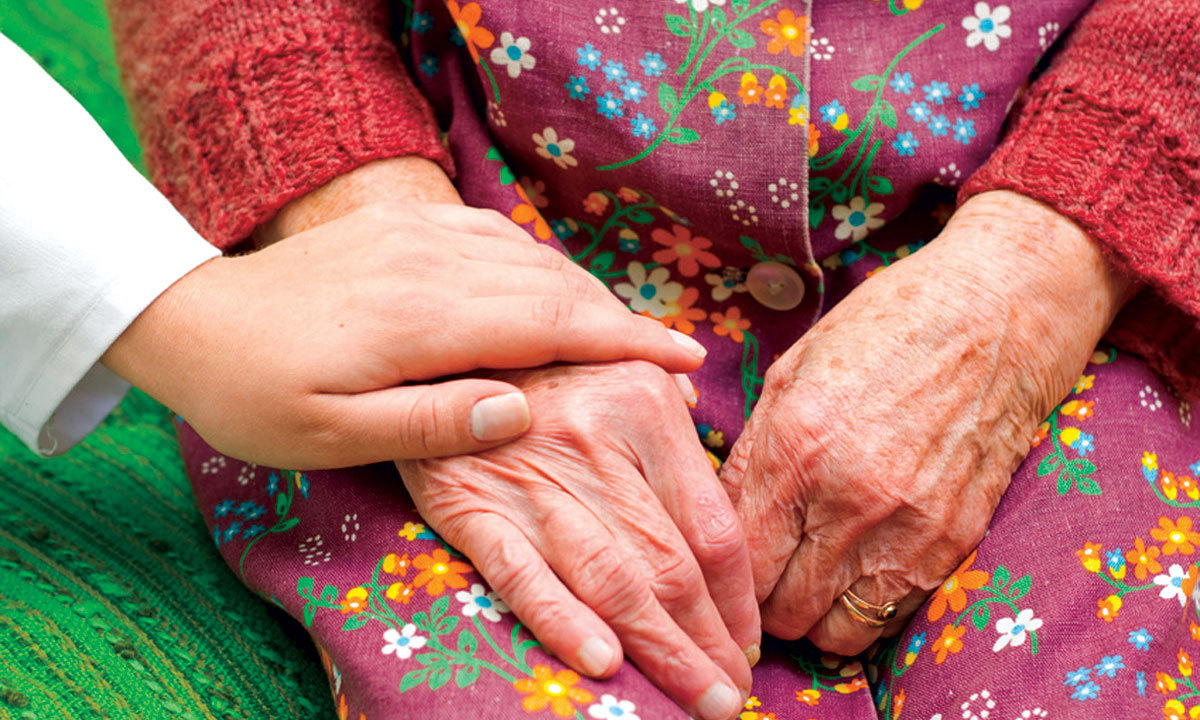
“‘In sickness and in health … till death do us part.’ These words echo in my ears since the day my husband left this world. The world came crashing down for us,” is Naheed’s response when asked about healing. “Life has just not been the same ever since — the acute, piercing pain returning at all moments as a reminder of our loss, be it Eid or birthdays or weddings.”
Shock, panic, pain, anger, a sense of disbelief … and perhaps a ‘Why Me?’, are just a few of the emotions that accompany a loved one’s death. Those who are grieving may just want life to stop, yet it goes on, and they have to deal with complicated worldly affairs along with their own feelings. “Depression is normal and natural,” says Humaira who lost her husband suddenly and needs to learn to live in an entirely new way. “Faith has played an important part in my healing and being able to move on. At first the ‘Why Me?’ haunted me as I have no relatives in Pakistan and my grown children are also living abroad, but the thought that God knew what he was doing and must have had a reason gave me comfort. Friends and extended family helped. This gave me strength to pick up my life’s pieces.”
The cruel ‘Why Me?’ is something that the grieving may ask and there is nothing like the loss of one’s own child that may bring up this question. Sara and Murtaza, going through a real struggle as they come to terms with the loss of a teenage daughter suggest that thoughts like these should not be suppressed but be allowed to come up in the trusting embrace of a friend or a trusted counsellor, mentor or religious scholar. They feel blessed to have found both. ‘It’s difficult as 90 per cent of religiously inclined people actually create more problems and pain by citing out of context religious verses. They wish that these well-meaning ill-informed people had kept their half-baked views to themselves. “The only friends we consider as real are those who just showed silent support in this difficult time by helping us with chores involving our two other children. Sermonising people who were uncomfortable with us venting are not those we associate with any longer.”
For some, like Bano Apa, the faith element is so strong that the ‘Why’ question didn’t arise and accepting God’s will sustained her. “I am thankful that my son passed away on the auspicious day of 27th Ramazan. I feel that God’s love for him was greater than mine. I decided against wailing and lamenting as my son would not have liked that. I pray, not only for him but for all others who have passed away and this provides solace. Of course I miss him, and sometimes converse with his photographs — and somehow that too brings me peace. I know he is in a good place.”
NK who lost his wife to cancer also speaks about allowing emotions to surface and keeping busy at the same time, “What helps me most to pass each day is my job that keeps me involved and prevents melancholy. My colleagues at work are also very sincere and understanding. Once I am home, the sadness tends to surface, as there are so many reminders all around the house. The best release that I get is from talking about her, bringing her back to life, hearing others who loved her talk about her great humane qualities. I also pen down my feelings on paper, which gives me a chance to vent my emotions which is a great catharsis.”
So can one find meaning in grief? For Humayun, who lost a close friend, it’s a wake-up call. “I’ve been putting away my dreams, thinking of ‘some’ day in the future when I will pursue them. What if my time is up before that ‘some’ day arrives?” Such is the case with so many of us. We can think of death as a transition to another destination — another journey which the soul must take. But have we consciously fulfilled our desires, our unfinished business in this journey. “Mortality awareness” prompts other healthy behaviours according to scientific research. People are more health conscious, more keen to help others and let go of petty issues.
Faith, it is apparent, is a real driving force in healing even in the young — Tariq lost his mother at a young age and then lost his elder brother in a tragic accident. The tranquillity with which he speaks is way beyond his years. “Parents set the benchmark and my father’s training was to hold on to God and believe that things happen for a reason — even though the incident may appear so horrible and unfair. Faith to me is an internal state of acceptance of God’s will. Since I lost my mother at an early age, the afterlife always interested me and I often wondered what it would be like to be there. Although the struggles of this life are real, if you believe in an afterlife the struggles of this life become bearable.”
Healing, hence, is mysterious. How it happens and a ‘Letting Go’ at the soul level emerges has no straight path. Faith, prayer, keeping busy, venting, talking, crying, grieving … perhaps it is a combination of all of these that leads to that quiet surrender and a humble acceptance of how little we control, and in a strange paradoxical way that leads to solace. A life well lived is perhaps the pathway that leads to ‘forever living’ in what the poet Blake calls eternity’s sunrise.
He who bends to himself a joy
Does the winged life destroy
But he who kisses the joy as it flies
Lives in eternity’s sunrise
— William Blake
Bureaucracy and red tape don't care if you're in mourning ... read on to learn why you have to think about the unthinkable.
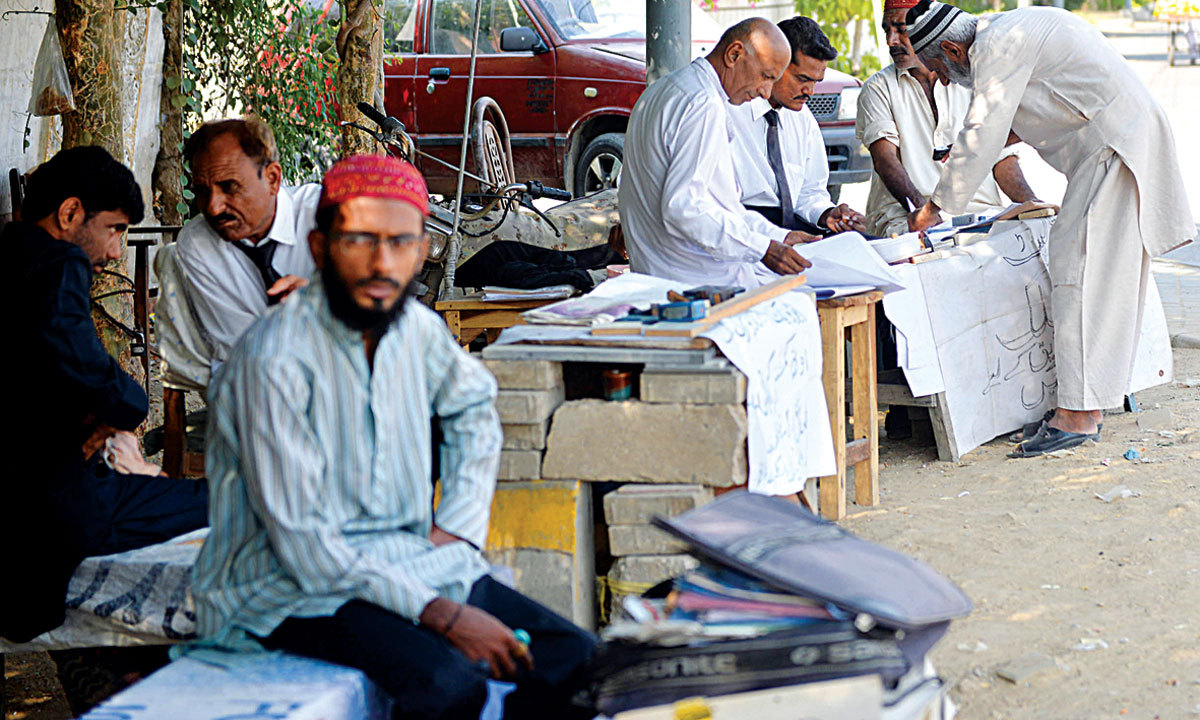
The news of his passing came as a shock. After all, my uncle had looked so robust the last time we met, debonair in a pristine white shirt and his favourite silk tie. For years he had been living by himself because his wife needed to stay abroad to complete her immigration process, while his daughters were married with their own families. They would visit regularly but death came when he was in Pakistan and his immediate family was abroad.
The last rites were completed and we got to the sad but necessary business of passing his assets to his immediate heirs. All persons of a sane and rational mental state, regardless of their nationality or residential status, are entitled by law to inherit both the movable and immovable property. These laws take into consideration the deceased’s religion (Muslim, Christian or a Hindu) and matters are dealt in accordance with their faith.
In this case, my aunt would inherit everything (the daughters had decided to forego their share to make the process as simple as possible) and it seemed like a simple procedure. We were wrong. My uncle had not made the necessary transfers and everything was in a single account or sole custody. The first stop was the court to get a certificate of heirship. This document allows the bearer the right of property transfer of the deceased. We had to hire a lawyer, a veteran, who promised to resolve the matter at the earliest.
Unfortunately for us, the ‘earliest’ was two weeks and that was far too long since my aunt had a return flight scheduled. We tried to explain the situation but the lawyer was quick to point out that the matter is in the hands of the court and getting these things done always takes a fair amount of time. Meanwhile my uncle’s car and other moveable possessions were to be disposed of as well. My aunt had to reschedule her flight and we got a taste of the machinations of the legal system in the country.
Eventually we were able to get the succession certificate made. The next step was to have my aunt be declared the natural heir and the property passed on to her. My uncle had a salary account and a savings account in different banks. The banks required the succession certificate to pass on the liquid assets to my aunt but there was another problem here: the accounts had not been accessed in a while. My uncle had been depositing money in them but had not taken any money out for the last six months and the accounts had gone dormant. We explained that the account holder was no longer alive but it did not work.
We drew an application and submitted it with the request that the matter be resolved as soon as possible, but the banker simply replied that it will take as long as it has to take and he cannot do anything about it. The callous remark hurt. In all the trips to the court no one had considered the sensitivity of the situation. My aunt was made to repeat the story again and again, and each time she would get overcome with sorrow. When I tried to explain, I was told that I am not the heir and she had to explain the situation herself. She was made to continue in spite of her tears.
One way of getting round this is by passing on liquid assets through outward remittances. The State Bank of Pakistan has made this allowance and an application is sent to the State Bank with the name, location and nationality of the deceased. If the deceased has left a will it is much simpler, but in the absence of a will the State Bank needed proper Letters of Administration which would be verified and stamped by a notary or a judge or a magistrate. Along with this we would have to submit a full statement of the deceased’s assets in Pakistan as well as a copy of his bank statement showing details for the past two years. Amounts which are not allowed to be sent abroad are put in a blocked account in a local bank in the name of the executor of the estate to be dealt with later.
With bank matters taken care of, we had to dispose of his cars. For this we had to go to the Car Excise and Taxation Department and similar procedures of passing on the assets were conducted. The officer on duty saw that we were in a race for time and indicated that a proper ‘gift’ will speed matters. At the end we were so tired that we were tempted to simply walk away but since much hard work had been put in for acquiring these assets we could not let hurdles get in the way of transferring the property to the rightful heir.
Therein lies a lesson for all families. It’s always best to plan a smooth transfer of property. We, in Pakistan, are often unconcerned about such matters but only end up making life difficult for our loved ones. In this entire process my aunt was running from pillar to post, filling out this form and that form. To face all this red tape is arduous in any case and after a devastating loss it is even more unbearable. Our institutions often make matters worse and we must face the fact that one day we all have to die and for the sake of our loved ones plan accordingly. Bank accounts, property, shares and savings certificates should all be entered into a water tight will and handed to an able executor who will pass on the assets to the heirs. Death is inevitable but it need not be made more painful than it already is.

“My youngest sister was 14 when my parents died in the year 2008 and that is when I had to become her guardian,” says Zafar Ali.
While he wanted to protect and do the best for his sister, what he didn’t expect was harassment and misuse of power by the relevant authorities.
“In order to get things done, we needed heirship certificates and succession letters so that the property was placed in our name. We needed a guardianship certificate for my sister S.”
Going by the law, a father and mother are the legal guardians of a minor. If the father passes away, the mother becomes a guardian. But if both parents pass away, the court has the power to award guardianship to a relative with a petition filed under Section 7 and Section 8 Guardians and Wards Act 1890.
“My lawyer advised that I should file for a hearing but what followed next was just plain and simple abuse of power. I filed the relevant documents including the Nadra family tree, the B-form, documents and support letter identifying that S was my sister,” he recalls.
“The lady judge kept on delaying the hearing on one pretext or the other. Then she asked me to prove that S was my sister and on multiple occasions said I was a fraud. My neighbours came as witnesses and so did the headmaster of my sister’s school. After two years and many hearings, the judge went on maternity leave. I was so fed up that I gave up on the issue.”
All this while, the bank accounts of Ali’s parents remained frozen and the properties could not be transferred.
“The day my sister turned 18, I took her to Nadra for her CNIC. The process was much easier as all I needed to submit was the B-form and death certificates of my parents and things went fine,” he says.
While Ali’s case highlights the incompetence on part of the powerful, much different were the plights of Laila Burguri and Mrs Tajwar.
Her husband disappeared in the 2010 floods in Khairpur Nathan Shah and she moved to the UNHCR’s 500-tent city in Jhakhra, District Dadu. Back then, the mother of five children was refused a Watan Card that was aimed at rehabilitating flood victims.
“I had no nikahnama (marriage certificate) and I didn’t even have the death certificate for my husband,” she says.
It was presumed that he went missing and died during the calamity.
“I reached out to the officials of my areas’ and they wrote letters identifying me as the widow but my form was again rejected because I didn’t have a CNIC,” the village woman says.
In Mrs Tajwar’s case, she was harassed by family members as well as her husband’s acquaintances, with threats of kidnapping and acid attacks being sent her way.
Unlike most men who shy away from placing the names of their wives as co-owners on property, Tajwar’s husband, a middle-class building contractor, went ahead and placed her name on the plots he bought and ran a joint account with her. He went to the extent of sharing all legal details and equipped his wife with the knowledge that helped her make informed decisions.
“When he died, one person after another started showing up, saying that he owned them money or that they were the joint owners in X, Y, Z plots. Then there were my in-laws who started pressurising me to marry my daughters to their sons. On top of it all, my eldest brother-in-law said that I should marry him or at least give him a power of attorney so that he is able to protect us,” says Tajwar.
She stresses that the head of the household must share financial and legal details and empower their survivors. “No one is going to feed your children once you are dead. Blood relations are ready to stab you in the back. I see so many women and children who got nothing out of the assets of their husbands and fathers. Also women are easier to repress and harass,” she sums up.
While Ali, Burguri and Tajwar were able to get some relief, there are millions in this country in this country who face a worse fate due to their marginalised status.
Take for instance the case of Boota Masih who was hired by a Mohalla committee to clean a choked gutter line in 2006 and was promised Rs500 as wage. Working as a sweeper in Karachi’s Saddar area on a meagre salary, he was ready to do the task which meant he could earn a week’s earning in one day.
“My father went down into the gutter and fell unconscious due to the poisonous gases. He was disoriented and there was no one to take him out. No one wanted to go down and rescue him,” recalls his daughter Sobia (not her real name). It took almost an hour before Edhi was called and one of the volunteers of the charity service got hold of the body.
“Forget the Rs500 the residents promised, they even refused to acknowledge that they hired my father to clean the gutter. On top of it, we were threatened with cases and many families in the building refused to employee me and my mother as housemaids,” Sobia says.
Some scams are born in times of great sorrow, in the name of our dearly departed.
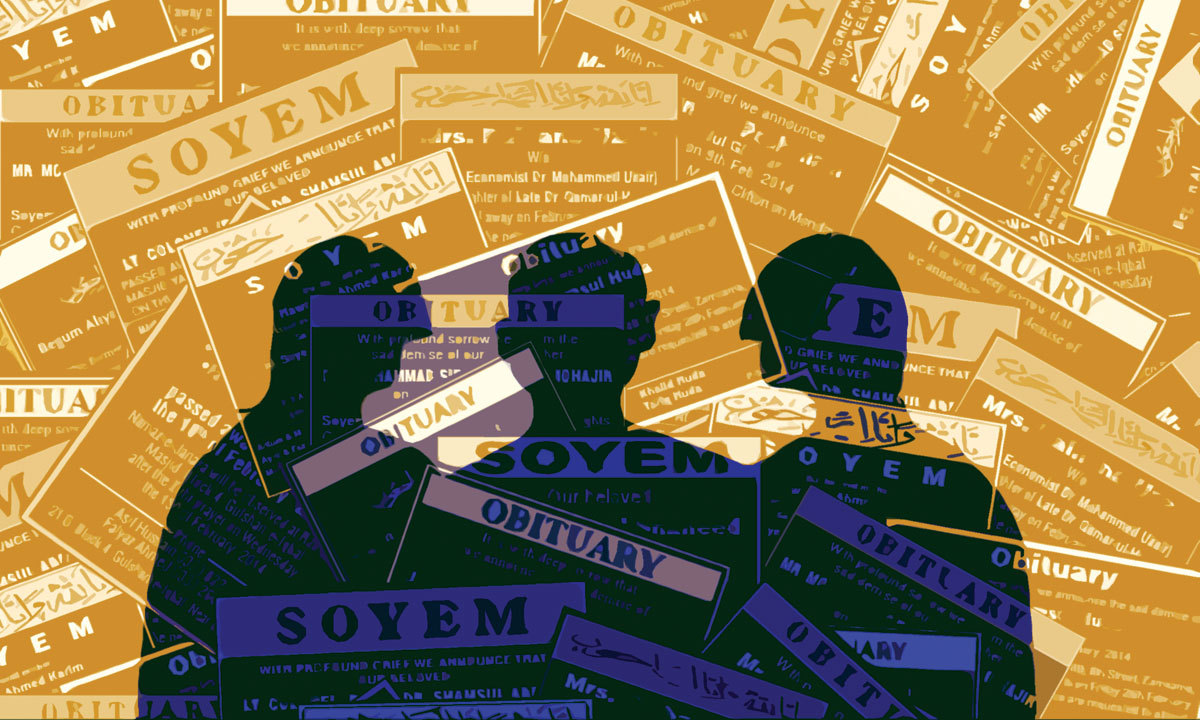
Nazir Ali didn’t return to the human world as a spirit, he reappeared as a big, fat debt.
An accountant at a multi-national firm in his prime, Ali was living a blissful life of retirement before his demise in August, 2013. He had enjoyed a happy marriage and seen all three of his daughters get married and have children. His wife had passed away after the wedding of their second daughter, in 2001. By 2006, all daughters were wedded — two of them moved abroad later on.
Naheed’s (the daughter who remained in Pakistan) husband, Shahid, took the lead in funeral arrangements. Shahid also played host to the men who came to offer their condolences.
“We knew he was a benevolent man, who had been helping people out without us knowing,” says Shahid. “We expected them to show up, and so we placed an announcement in the papers about his Soyem.”
A week later, two men showed up at Ali’s residence, where the two daughters who lived abroad, were lodged. Presenting themselves as employees of a jeweller, they showed the daughters a receipt for three identical gold sets — a sum totalling just over Rs500,000. According to the receipt, Rs100,000 had already been paid and the rest was outstanding and overdue by two weeks.
“We never expected people to show up and claim our father owed them any money. He wasn’t the sort of man who owed people anything,” says Naheed.
The sisters swept the house for any jewellery sets that their father might have bought and hidden. “My sister who had come from Birmingham actually wanted to find the set, because she though it’d be like a parting gift from our father. If we found the sets, she said she’d buy them for us,” says Salma. But they never found them.
Repeated harassment from the two men meant that the family coughed up Rs10,000 — only to buy time for the two sisters from abroad to pack up and leave, a week before the Chehlum. Naheed and Shahid later enlisted the help of local political workers to stave off any returning claimants.
But perhaps, Naheed and Shahid should have turned to law enforcement instead, or at least, have informed them. Scant reporting of such incidents means that police cannot keep track of the number and frequency of operations, or even the modus operandi of such tricksters.
“I cannot deny that such incidents happen, but they remain mere gossip because people don’t report them,” says Mehdi Raza, the head controller at the Citizens Police Liaison Committee (CPLC).
“Placing an advertisement about deaths is bad practice. It is practically inviting people to make false claims,” Raza strongly argues.
Rafiq Khan also made the mistake of putting up an advertisement about his father’s demise. His hustlers had their eyes on a different prize: a recently-bought imported sedan, maintained in mint condition.
“They came on the day of the Soyem, two respectable-looking men, and stayed till the end,” Khan narrated.
“As I was saying goodbye to my guests, these two men offered their condolences and told me that they wanted to pick the car up in a day or two. I obviously looked baffled, to which they asked if my father had left any instructions about his car. They produced car ownership documents, which showed that the car no longer belonged to my father.”
Refusing to believe that his father would keep such a financial transaction private, Khan had someone check records at the motor vehicle department. He also asked for his father’s recent bank transactions.
“After some hassle and greasing some palms, I discovered that the car was still owned by my father, and that no cheques had been deposited in his account,” Khan said. “I knew then that those two men were trying to defraud us.”
The next time the two men showed up, Khan met them at his gate and told them never to return again, or else, his security guards would open fire on them.
“Most post-death disputes are about land — plot ownership, missed rents, etc. But there is usually a paper trail involved when it comes to land,” explains CPLC’s Raza. “Business accounts are generally maintained and settled at offices. They have no place in personal matters,” he adds.
“It is only private transactions that can be contested, but usually, these are carried out on a basis of trust. That means the two parties would know each other well and can sort it among themselves,” he says.
“If you look at Muslim practices, family members of the deceased have to announce at the time of burial that those owed money need to speak up. The deceased’s family then enters a verbal contract with the creditor at the time, and negotiate terms for repayment later. How can you trust a man who won’t come to your funeral?” argues Raza.
Names changed to protect privacy
A Succession Certificate is required to transfer the property of a deceased person to his legal heirs. This property includes bank accounts, insurance amount, real estate, stocks, bonds, shares, etc. The Succession Act of 1925 or Law of Succession 1925 is the administrative tool that takes care of all the procedures related to the Succession Certificate.
The application for the certificate is filed in the court in two ways. In the first case one legal heir files the application on behalf of all others with the understanding that upon receiving the property he or she will distribute the assets among the other legal heirs. The other legal heirs record their statement that they back the designated heir to take the matter forward and that they have no objection to the succession certificate being issued to that one legal heir.
In the second method all the legal heirs file in their own applications for the succession certificate and the court grants one to all keeping in mind their share of the property. They can thus get their share depending on what was allocated to them by the deceased.
The application is filed in the civil court of the area in which the deceased was residing. In case of the permanent place of residence not being confirmed or if he was residing in different places at different times then the application should be filed in the court which is in the vicinity of where the property of the deceased is located.
Once the application is filed, the court issues orders to publish notices in papers asking any other claimants of the property to come forward and contest the case if they wish to. If no one comes forth after a reasonable amount of time the court awards the succession certificate to the applicant or applicants. If there is a contestant who presents his case as a legal heir after the posting of the notice the court adjudicates on the matter based on the evidence and passes its judgment to give succession to whom it seems fit.
In case of a widow, she can file the application in the requisite court and obtain the certificate. If the deceased’s children are minors she can even file the application on their behalf as their natural guardian. While succession laws are critical they are largely misunderstood and the awareness level of this aspect is generally low.



